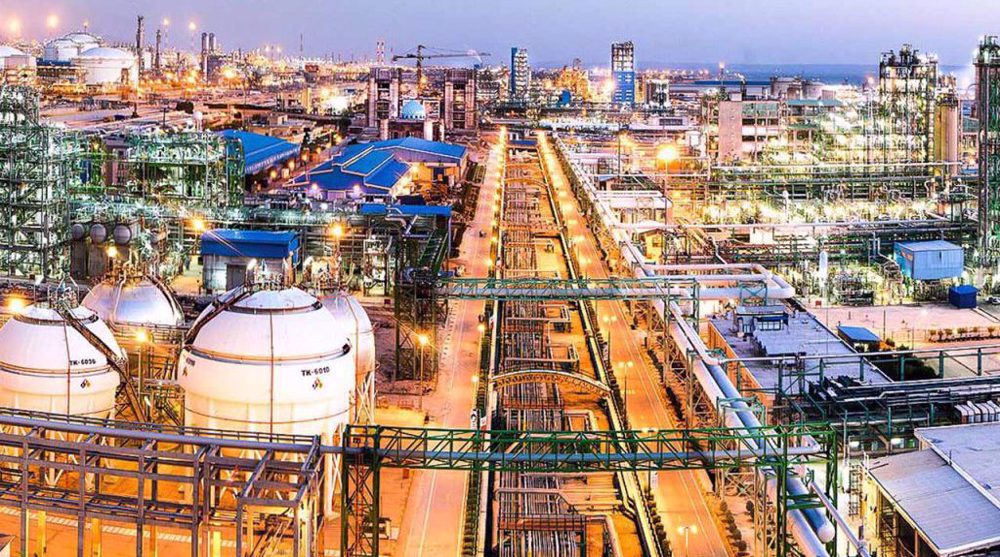Iran has received an offer for $2.5 billion of investment in its petrochemical sector from a foreign country, Chief Executive of the National Petrochemical Company (NPC) Morteza Shahmirzaei says.
“Amicable countries have many requests to invest in Iran in order to build petrochemical and petrochemical hubs in Makran and Jask. For example, one of the countries has put an investment proposal of $2.5 billion on the table. Unfortunately, due to sanctions, we cannot provide more details,” he said Monday.
Tehran will host the 14th international Iran Petrochemical Forum (IPF) next week. Shahmirzaei said experts and entrepreneurs of the petrochemical industry from 15 countries, including Brazil, Russia, China and several European countries, will attend the event.
Seventy petrochemical plants are currently operational in Iran, churning more than 550 grades of products. The official said ten more facilities will come on stream by the end of the current Iranian year in March 2024.
“The capacity of Iran's petrochemical industry has reached 92 million tonnes, and with the opening of new projects, this capacity will reach 95 million tonnes by the end of the year,” he said.
Petrochemical products are a crucial boon to Iran’s derive to weather draconian US sanctions which mainly aim to dry up the Islamic Republic’s oil exports.
Iranian officials say the wide diversity of petrochemical products and huge international demand for them because of their quality and price make the industry unsanctionable.
Washington imposed its first sanctions on Iran’s petrochemical sector back in June 2019. It banned purchases of Iranian aromatic, olefin, and synthesis gas, and any of their derivatives, including ethylene, propylene, butadiene, benzene, toluene, xylene, ammonia, methanol, and urea.
The US Treasury Department said in a statement at the time that the sanctions aimed to choke off financing for Iran’s largest and most profitable petrochemical group.
In February, the Biden administration imposed a fresh round of sanctions on several Iranian petrochemical manufacturers or their subsidiaries.
The sanctions also targeted three firms in Malaysia and Singapore over their role in the “production, sale, and shipment of hundreds of millions of dollars’ worth of Iranian petrochemicals and petroleum to buyers in Asia.”
Among the targeted Iranian companies were Amir Kabir Petrochemical Co. (AKPC), its subsidiary Simorgh Petrochemical Co. and four subsidiaries of previously sanctioned Marun Petrochemical Co.
“Iran is increasingly turning to buyers in East Asia to sell its petrochemical and petroleum products, in violation of US sanctions,” Under Secretary of the Treasury for Terrorism and Financial Intelligence Brian Nelson said then.
Iran’s petrochemical industry is largely self-sufficient, but it is dependent on imports for more than 25 percent of goods, equipment and chemicals, Shahmirzaei said.
“Even in some units, this amount of dependence reaches 30 percent. We have agreed with domestic technologists and knowledge-based companies to localize the equipment which are mostly high-tech,” he said.
Currently, the localization of rotating machines is on the agenda, he added.
“We must produce all the world's strategic petrochemical products in Iran, and it is necessary to move from selling raw materials to producing and selling final products.”
In 2021, Iranian experts updated for the first time a distributed control system (DCS) built by US industrial conglomerate Emerson Electric at a petrochemical plant in the southwestern port of Mahshahr.
Distributed control systems are computerized platforms for automated control and operation of a plant or industrial process, usually with many control loops, in which autonomous controllers are distributed throughout the system.
The Emerson DCS used at the Shahid Tondgooyan Petrochemical Company (STPC) was obsolete, which had caused major production problems at the plant's PET 1 unit, the company said in a statement.
The US company's refusal to cooperate and provide support because of the American sanctions prompted Iranian experts to revamp and update the system without laying off production units, it added.
For the update, the system needed a year to be programmed for upgrade, after which the production units had to be shut down in order to incorporate the new application into the DCS.
"After the programming, due to the commitments of the STPC and the vital and important role of its products in different industries of the country, it was not practically possible to stop all units in order to run the new program," the company said.
"So, the closure of production units separately was assessed and approved, as a result of which no disruption occurred in the company's commitments to support national production."
A month earlier, the STPC said Iranian experts had designed and built a rotary air compressor which it badly needed in its polyethylene terephthalate (PET) unit but could not import because of US sanctions.



























